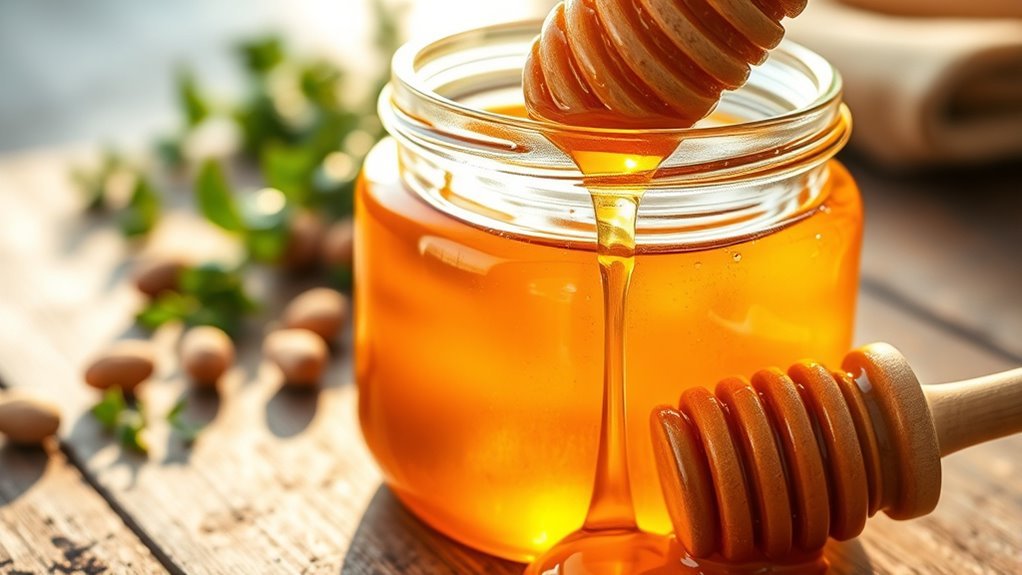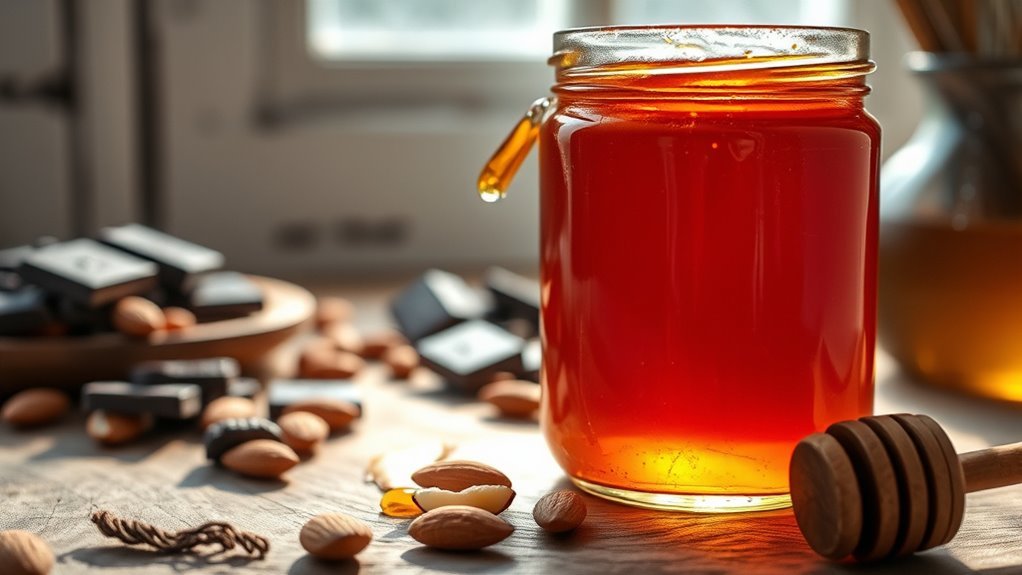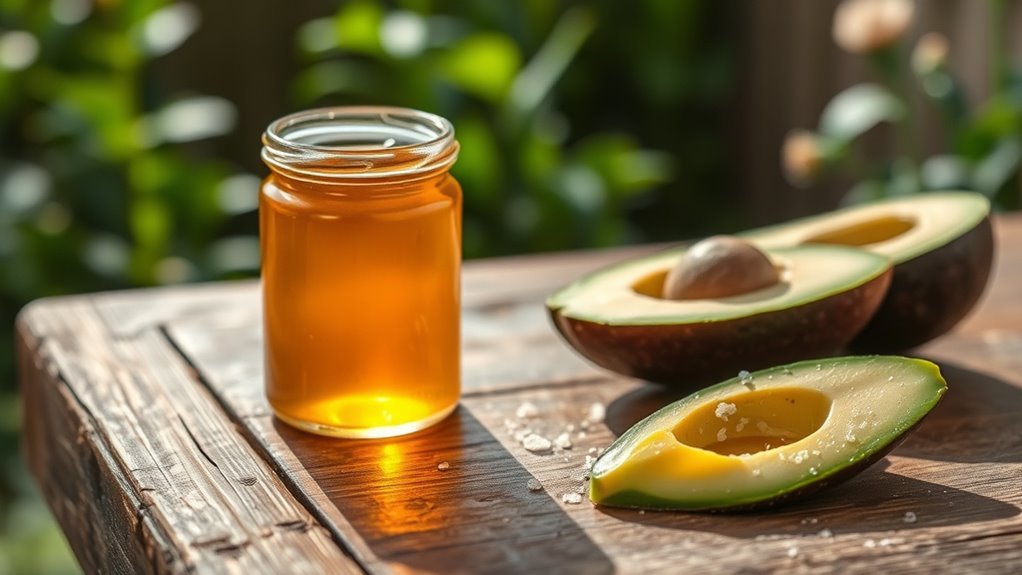Honey can be included in a keto diet, but you need to be cautious. It has about 17 grams of carbs per tablespoon, which can affect your daily carb limit. While honey offers some health benefits and antioxidants, using it sparingly is essential. Consider balancing it with low-carb foods to maintain ketosis. If you want tips on how to incorporate honey effectively, there’s more to explore about making it work with your keto lifestyle.
Understanding the Keto Diet

When you plunge into the keto diet, you’ll quickly discover that it revolves around drastically reducing carbohydrate intake while increasing fats. The keto basics emphasize achieving a state of ketosis, where your body burns fat for energy instead of carbs. Many diet misconceptions suggest that eating fat will make you gain weight, but this approach can actually promote weight loss when done correctly. You’ll focus on whole foods like avocados, nuts, and oily fish while avoiding sugary snacks and starchy foods. It’s essential to track your macronutrient ratios to guarantee you’re staying within your carb limits. By understanding these principles, you can embrace the freedom that comes with a well-structured keto lifestyle, enabling you to make informed choices about your food. Additionally, being mindful of carbohydrate intake is crucial for maintaining ketosis and achieving your keto goals.
Nutritional Profile of Honey

When considering honey’s place in your diet, it is crucial to look at its macronutrient breakdown, which primarily consists of sugars. You’ll also want to understand its glycemic index and how it can affect your blood sugar levels. Additionally, exploring the potential health benefits of honey can help you make a more informed choice.
Macronutrient Breakdown
Although honey is often praised for its natural sweetness and potential health benefits, understanding its macronutrient breakdown is vital for those following a ketogenic diet. Honey primarily consists of carbohydrates, with about 17 grams per tablespoon and roughly 64 honey calories. This high carb content can greatly impact your daily macronutrient ratios, especially on a keto diet that typically limits carbs to around 20-50 grams per day. While honey does contain trace amounts of vitamins and minerals, its substantial sugar content may not align with your keto goals. As a result, it’s important to evaluate how honey fits into your overall dietary plan and consider alternatives that provide sweetness without the carb burden. Additionally, the high glycemic index of honey can lead to rapid blood sugar spikes, making it a less desirable option for those aiming to maintain ketosis.
Glycemic Index Impact
Understanding the glycemic index (GI) of honey is vital for anyone on a ketogenic diet, since it measures how quickly a food raises blood sugar levels. Honey has a GI ranging from 45 to 64, which means it can cause a moderate glycemic response. This can be concerning for those strictly monitoring carb intake to maintain ketosis. If you’re seeking options with lower GI values, honey alternatives like stevia or erythritol might be better choices, as they typically have minimal impact on blood sugar. It’s important to take into account how even small amounts of honey can affect your overall carb count. Ultimately, if you choose to incorporate honey, do so mindfully and balance it with other low-GI foods. Additionally, consider the carbohydrate intake in your overall diet to ensure you stay within your limits.
Health Benefits Overview
While you might be tempted to use honey for its natural sweetness, it’s vital to evaluate its nutritional profile to fully grasp its health benefits. Honey is rich in antioxidants, which can combat inflammation and support your immune system. It’s also known for its antibacterial properties, making it a popular natural remedy for sore throats and coughs. Additionally, honey contains trace amounts of vitamins and minerals, such as B vitamins and vitamin C, which contribute to overall health. However, it’s essential to remember that honey is still a sugar, and moderation is key, especially on a keto diet. So, while honey offers some appealing benefits, be mindful of your overall carbohydrate intake to maintain your desired health goals.
How Honey Affects Blood Sugar Levels

When considering honey’s role in your diet, it’s important to look at its glycemic index and how it influences insulin response. Honey has a moderate glycemic index, which means it can raise blood sugar levels, but its impact can vary based on the type of honey. Understanding these factors can help you make informed choices, especially on a keto diet where blood sugar management is essential.
Glycemic Index Comparison
How does honey stack up against other sweeteners when it comes to blood sugar levels? Understanding the glycemic index (GI) can help you make informed choices. Here’s a comparison of honey to some common sweetener alternatives:
- Honey Varieties: Depending on the type, honey typically has a GI of 45-64, which means it can raise blood sugar levels, but not as sharply as refined sugars.
- Stevia: This natural sweetener has a GI of 0, making it a better option for those concerned about blood sugar spikes.
- Agave Nectar: Often marketed as a healthier option, it has a GI of around 15-30, making it lower than honey.
When considering sweetener alternatives, weigh the impact on your blood sugar levels carefully. Additionally, it’s essential to recognize that the ketogenic diet emphasizes stable blood sugar levels, which can be significantly affected by the choice of sweeteners.
Insulin Response Analysis
Although honey is often perceived as a natural sweetener, its impact on insulin response is vital for those following a ketogenic diet. When you consume honey, your blood sugar levels can rise more than they would from other keto-friendly sweeteners. This spike can lead to a decrease in insulin sensitivity over time, making it harder for your body to manage glucose effectively. While honey contains beneficial antioxidants, its high carbohydrate content may not align with your keto goals. For ideal insulin management and to maintain stable blood sugar levels, it’s important to monitor how your body reacts to honey. Ultimately, it’s about finding a balance that supports your health while allowing for occasional indulgences.
Carb Limits on a Ketogenic Diet
To maintain a state of ketosis, it’s crucial to understand the carb limits on a ketogenic diet. Generally, you’ll want to keep your daily carb intake around 20-50 grams. This helps your body shift from burning glucose to burning fat for fuel. Here are three key points to reflect on:
- Choose low-carb sources: Focus on non-starchy vegetables, nuts, and seeds to meet your carb needs while enjoying keto flexibility.
- Track your intake: Use apps or journals to monitor your carbohydrate consumption; it’s imperative for staying in ketosis.
- Adjust as needed: Everyone’s body is different, so you may find that your ideal carb limit varies. Additionally, understanding your body’s individual factors can help you tailor your carb intake for better results.
Possible Benefits of Honey on a Keto Diet
While maintaining a low carb intake is key to staying in ketosis, many people wonder if honey can fit into this framework. Honey offers potential benefits, as it contains antioxidants and can support your immune system. When considering honey’s role in a keto diet, think about the concept of nutritional synergy—how honey’s natural compounds might enhance your overall health when used sparingly. Additionally, it’s important to note that honey’s high carbohydrate content may limit its use for those strictly adhering to keto guidelines.
| Benefit | Description |
|---|---|
| Antioxidants | Helps combat oxidative stress |
| Immune Support | Natural remedy for boosting immunity |
| Energy Boost | Provides a quick source of energy, if needed |
| Gut Health | Promotes healthy digestion through prebiotics |
Incorporating honey mindfully can allow you to enjoy its benefits without derailing your keto goals.
Alternative Sweeteners for Keto
As you navigate the keto diet, finding suitable alternatives to traditional sweeteners can keep your carb intake in check without sacrificing flavor. Here are some excellent natural sweeteners and keto-friendly options to evaluate:
- Stevia: A plant-derived sweetener that’s calorie-free and doesn’t spike blood sugar levels.
- Erythritol: A sugar alcohol with minimal calories and carbs, often used in baking and cooking.
- Monk Fruit: Another natural sweetener that’s calorie-free and offers a unique taste without impacting your ketosis.
These alternatives can help satisfy your sweet tooth while aligning with your keto goals. Additionally, using sweeteners like Zevia soda can provide a refreshing beverage option without increasing your carb intake. Remember to experiment with different options to find what works best for your palate and lifestyle. Enjoy the freedom to indulge without compromising your dietary choices!
Recommendations for Incorporating Honey Into Your Diet
Although honey is generally considered too high in carbohydrates for a strict keto diet, you can still incorporate it in moderation if you’re mindful of your overall carb intake. Here are some recommendations for adding honey to your meals and snacks:
| Honey Use | Suggested Amount | Pairing Ideas |
|---|---|---|
| Sweetening Drinks | 1 tsp | Tea, coffee |
| Salad Dressing | 1 tsp | Olive oil, vinegar |
| Keto Snacks | 1 tbsp | Nut butter, yogurt |
| Honey Recipes | 1 tbsp | Keto pancakes, muffins |
| Marinades | 1 tbsp | Chicken, vegetables |
Frequently Asked Questions
Can Honey Trigger Cravings for Sugary Foods on Keto?
Honey can indeed trigger cravings for sugary foods on keto. When you indulge in honey, the sweetness might spark your desire for more sugar, leading you to seek sugar substitutes or other sweet treats. This cycle can be challenging if you’re aiming for a low-carb lifestyle. To maintain control, consider using alternative sweeteners that won’t spike your cravings, allowing you to enjoy freedom from sugar without compromising your keto goals.
Is Raw Honey Better Than Processed Honey for Keto?
Raw honey does have some benefits over processed honey. It retains more nutrients, enzymes, and antioxidants, which can support overall health. However, both types are high in sugars, potentially impacting your keto goals. When comparing processed honey, it often has added sugars and fewer nutrients. If you’re craving a natural sweetener occasionally, raw honey might be a better choice, but moderation is key to maintaining your keto lifestyle without triggering cravings.
How Much Honey Can I Use Without Exceeding Carb Limits?
To stay within your carb limits while using honey, aim for about one teaspoon, which has around 5.8 grams of carbs. It’s essential to incorporate that into your daily carb counting. If you find that too restrictive, consider honey alternatives like stevia or erythritol, which have negligible carbs. Balancing your sweet cravings with these alternatives can give you the freedom to enjoy flavors without compromising your keto goals.
Does Honey Offer Any Nutritional Benefits on Keto?
Honey does offer some health benefits, even on a keto diet. It’s rich in antioxidants, which can support your immune system and reduce inflammation. However, it does impact your carb count considerably, so moderation’s key. While you might enjoy the flavor and potential health perks, you’ve got to balance it with your daily carb limits. Weighing its benefits against your goals can help you make an informed choice.
Can Honey Be Used in Keto Baking Recipes?
You can use honey in keto baking recipes, but it may not be the best choice. Honey’s high sugar content can disrupt ketosis. Instead, consider honey alternatives like erythritol, stevia, or monk fruit, which are keto-friendly sweeteners. These options can provide the sweetness you crave without the carbs. Experimenting with these substitutes can help you enjoy baking while staying within your keto goals, giving you the freedom to indulge without guilt.
References
- https://www.healthline.com/nutrition/honey-on-keto
- https://www.ncbi.nlm.nih.gov/pmc/articles/PMC3611628/
- https://www.webmd.com/diet/obesity/honey-and-keto-diet
- https://www.wisewell.com/blogs/wisewell-blog/honey-on-the-keto-diet
- https://www.ncbi.nlm.nih.gov/books/NBK509855/
- https://www.livescience.com/honey-nutrition
- https://www.mayoclinic.org/healthy-lifestyle/nutrition-and-healthy-eating/expert-answers/honey/faq-20058210
- https://www.verywellfit.com/honey-on-the-keto-diet-5185513

